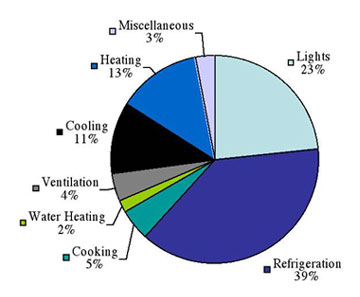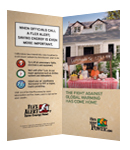Grocery and Convenience Stores
Energy-Saving Tips Cards
Download our hot weather energy-saving tips cards and reduce electricity costs as well as protect the environment.
What sets grocery and convenience stores apart from other small businesses? Their use of refrigerators:

Source: ENERGY STAR website, "Grocery & Convenience Stores"
Whether you operate a supermarket, grocery store or convenience store, refrigeration uses a lot of energy, which translates into high energy bills.
How You Can Save Energy Immediately
- Check temperature settings. If the settings are too low, your store may be wasting energy. The most common recommended settings are between -14° F and -8° F for freezers and between 35° F and 38° F for refrigerators.
- Keep evaporator coils clean and free of ice build-up. Dirt accumulation and ice build-up can prevent heat transfer and make the refrigeration system work harder to maintain the same temperature.
- Seal refrigerator and freezer doors. Air gaps let warm air enter the refrigerator or freezer and make the system work harder to maintain the same temperature. As a general rule of thumb, if you can slide a dollar bill between the door and the case, it is time to reseal the refrigerator or freezer.
- Invest in energy-efficient refrigerators and freezers to realize the greatest savings. All types of energy-efficient refrigerators are available on the market, including reach-in, walk-in and a multitude of food/drink storage and display cases. Just specify ENERGY STAR labeled models with your supplier.
How You Can Save Energy on Lighting
Do not forget about lighting! Lighting represents 23% of a typical store's energy use and can contribute significantly to energy bills.
- Disconnect or remove lamps in multiple-lamp fixtures and use task lighting where needed to reduce energy use by up to 50%.
- Upgrade the store and refrigeration case lighting to reduce energy use by up to 75%.
- Install occupancy sensors in rooms with low traffic (break rooms, restrooms, conference rooms) to reduce lighting costs by up to 40%.
Additional tools & resources
Take advantage of these tools and resources:










